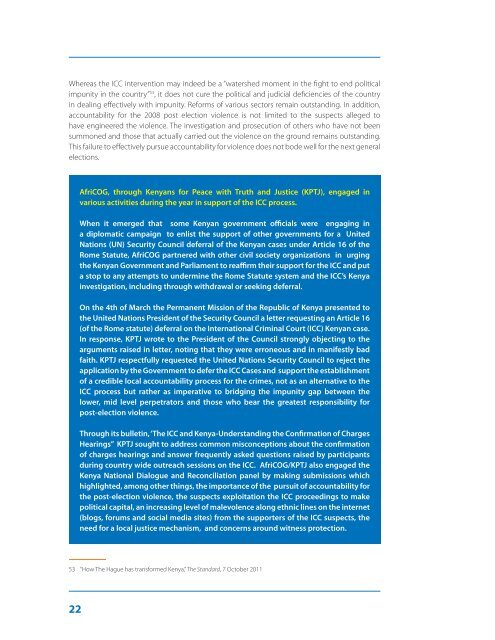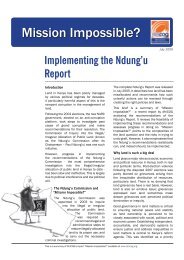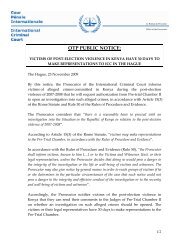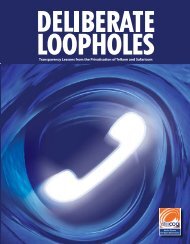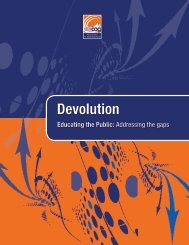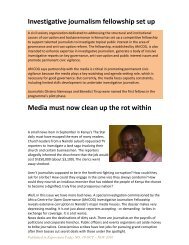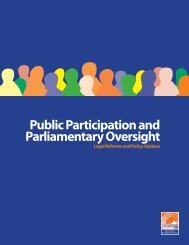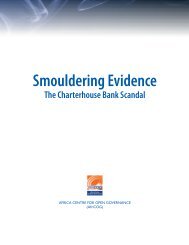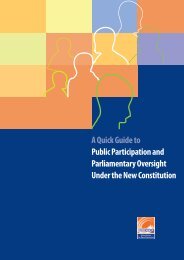Untitled - Africa Centre for Open Governance
Untitled - Africa Centre for Open Governance
Untitled - Africa Centre for Open Governance
You also want an ePaper? Increase the reach of your titles
YUMPU automatically turns print PDFs into web optimized ePapers that Google loves.
Whereas the ICC intervention may indeed be a “watershed moment in the fight to end political<br />
impunity in the country” 53 , it does not cure the political and judicial deficiencies of the country<br />
in dealing effectively with impunity. Re<strong>for</strong>ms of various sectors remain outstanding. In addition,<br />
accountability <strong>for</strong> the 2008 post election violence is not limited to the suspects alleged to<br />
have engineered the violence. The investigation and prosecution of others who have not been<br />
summoned and those that actually carried out the violence on the ground remains outstanding.<br />
This failure to effectively pursue accountability <strong>for</strong> violence does not bode well <strong>for</strong> the next general<br />
elections.<br />
AfriCOG, through Kenyans <strong>for</strong> Peace with Truth and Justice (KPTJ), engaged in<br />
various activities during the year in support of the ICC process.<br />
When it emerged that some Kenyan government officials were engaging in<br />
a diplomatic campaign to enlist the support of other governments <strong>for</strong> a United<br />
Nations (UN) Security Council deferral of the Kenyan cases under Article 16 of the<br />
Rome Statute, AfriCOG partnered with other civil society organizations in urging<br />
the Kenyan Government and Parliament to reaffirm their support <strong>for</strong> the ICC and put<br />
a stop to any attempts to undermine the Rome Statute system and the ICC’s Kenya<br />
investigation, including through withdrawal or seeking deferral.<br />
On the 4th of March the Permanent Mission of the Republic of Kenya presented to<br />
the United Nations President of the Security Council a letter requesting an Article 16<br />
(of the Rome statute) deferral on the International Criminal Court (ICC) Kenyan case.<br />
In response, KPTJ wrote to the President of the Council strongly objecting to the<br />
arguments raised in letter, noting that they were erroneous and in manifestly bad<br />
faith. KPTJ respectfully requested the United Nations Security Council to reject the<br />
application by the Government to defer the ICC Cases and support the establishment<br />
of a credible local accountability process <strong>for</strong> the crimes, not as an alternative to the<br />
ICC process but rather as imperative to bridging the impunity gap between the<br />
lower, mid level perpetrators and those who bear the greatest responsibility <strong>for</strong><br />
post-election violence.<br />
Through its bulletin, ‘The ICC and Kenya-Understanding the Confirmation of Charges<br />
Hearings” KPTJ sought to address common misconceptions about the confirmation<br />
of charges hearings and answer frequently asked questions raised by participants<br />
during country wide outreach sessions on the ICC. AfriCOG/KPTJ also engaged the<br />
Kenya National Dialogue and Reconciliation panel by making submissions which<br />
highlighted, among other things, the importance of the pursuit of accountability <strong>for</strong><br />
the post-election violence, the suspects exploitation the ICC proceedings to make<br />
political capital, an increasing level of malevolence along ethnic lines on the internet<br />
(blogs, <strong>for</strong>ums and social media sites) from the supporters of the ICC suspects, the<br />
need <strong>for</strong> a local justice mechanism, and concerns around witness protection.<br />
53 “How The Hague has trans<strong>for</strong>med Kenya,” The Standard, 7 October 2011<br />
22


